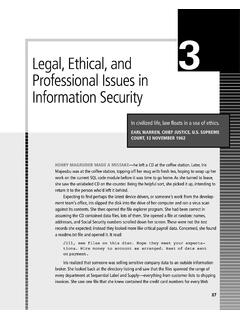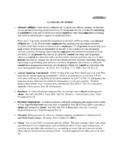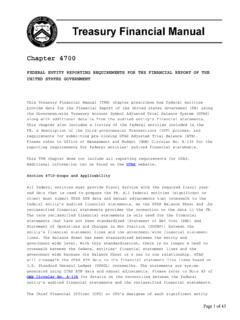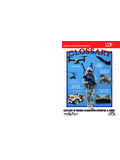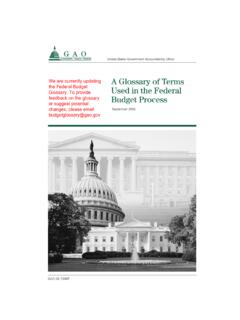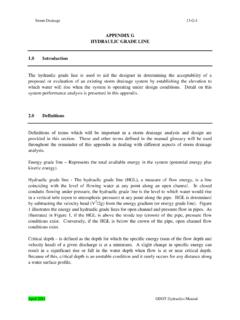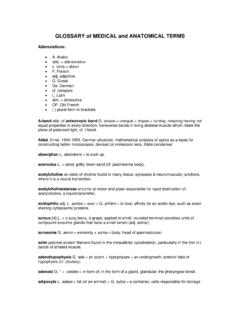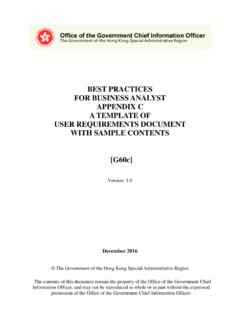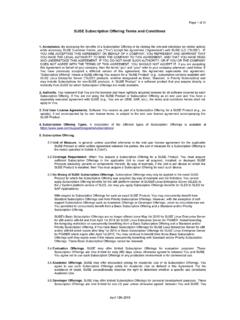Transcription of Glossary of Writing Terms - Grantham University
1 1 Glossary of Writing Terms A Abstract In APA, abstracts are found directly following the title page and are typically a 150-200 word summary of the following article or paper. Academic paper Academic papers are, for the most part, designed with two distinct purposes in mind: to analyze, interpret, explain, or argue about a topic; and to demonstrate an intellectual understanding of the course or field for which it is being written. Active sentence Active sentences are sentences in which the subject performs the action. Active voice Active voice entails the use of a subject-verb construction (active sentences) throughout the majority of a piece of Writing .
2 Adjective Adjectives provide information about, clarify, or describe nouns, pronouns, or other adjectives. Adverb Adverbs do very much the same thing as adjectives except they clarify and describe verbs. Agenda The underlying motivation for the creation of a text. Agreement Consistency in time, point of view, plurality or not, and so on within a text. Analysis The process of looking closely and critically at a text to determine what it means, how it presents its ideas, its effectiveness, and so on. Anecdote Brief stories or slices-of-life that help to make a point Annotate To underline or highlight important passages in a text and to make notes in the margins.
3 APA style The official Writing and documentation style of the American Psychological Association (APA), which is Grantham University s official style of documentation and citation for all courses. Appeal An appeal is an argument that connects to the readers needs, such as achievement, belonging, or survival. Appendix The Appendix at the end of a text, report, or dissertation, contains appendices that provided additional information pertaining to the text. Application paper An application paper focuses on experiences and qualities that suit the writer for a specific position or program.
4 2 Argument Argument involves a course in logical thinking intended to convince the reader to accept an idea or to take action. Argumentative paper An argumentative paper presents an argument about a timely, debatable topic. Artifact An artifact is an object made or modified by a human culture. Attributive phrase A group of words that indicates the source of an idea or quotation. Attributive tag See attributive phrase. Audience This term literally refers to the listeners or hearers of a speech, including the intended listeners/hearers, but is commonly used to refer to the intended reader or readers for a piece of Writing .
5 B Basic listing A brief, somewhat informal itemizing of main points. Biased words Words that unfairly or disrespectfully depict individuals of groups. Bibliography Lists of works that cover a particular subject. Block quotation A long quotation of 40 words or more. Block quotations are formatted in a way that sets them apart from the rest of the text by tabbing- in each line, omitting the quotation marks, and leaving the citation outside of the end punctuation. Blogs Online journals (shorthand for Web log ). Body language Body language is a communication style that involves the use of physical cues to indicate a person s level of comfort, interest, engagement, etc.
6 Body paragraph A paragraph comprising, in part, the central portion or body of a paper or other, similarly structured, document, which is focused on articulating, developing, and supporting a single point of the larger argument presented by the author with his/her thesis statement in the introductory paragraph(s). Boolean operators Words or symbols used when searching research databases that describe the relationship between various words or phrases in a search. 3 C Call numbers A set of numbers used by the Library of Congress that specify the subject area, topic, and authorship or title of a book, magazine, or other text.
7 Camera-eye An approach to Writing that involves sharing details as though a camera lens moving across a subject. Cause-effect paper A paper that examines the conditions or actions that lead to a specific outcome. Chronology Order of events as they have occurred in time. We often refer to descriptions of events in chronological order. Citation An agreed-upon notation that gives credit to those who informed the ideas within a text that did not originate with the text s author. Classical argument Until recently, the most popular of argumentative styles.
8 This style, invented in ancient Greece, involves two individuals arguing opposite sides of an argument in order to convince an unbiased third person. Clich s Overused words or phrases that, through time, have lost their meaning. For example, It s raining cats and dogs! or, It wasn t just easy; it was a piece of cake! Climax The most exciting moment in a narrative; the moment at which the person succeeds, fails, or learns something. Closed question Questions that can be answered by a simple yes or no . Clustering A form of brainstorming by freely recording words and phrases around a nucleus word.
9 Coherence Strong connection between sentences in a paragraph; achieved through transition and repetition. Collections The materials housed within a library. Colloquialism Colloquialisms are common words which work well in common conversation, but are not suitable for academic Writing . Words like, cool, sweet, y all, and gonna are colloquialisms. Often, these can also be whole phrases like, I was as nervous as a long-tailed cat in a room full of rocking chairs. Comma splice A common error in Writing made when the writer combines two independent clauses together with a comma (and nothing else).
10 ( There was no way I was going alone, she said she wouldn t dream of letting me out of her sight. ). Concessions Openly recognizing the validity of opposing viewpoints. 4 Conflict The obstacles or adversaries confronted by people in narratives; person vs. person, person vs. society, person vs. self, person vs. technology, person vs. nature, etc. Conjunction A word that joins two ideas within a sentence. For example: I love pizza, and I love tacos. The conjunction is and. Another example would be: I would love some pizza, but it gives me heartburn.

